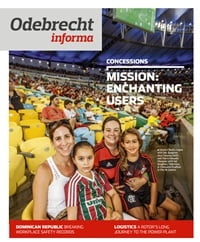Edition 171 – Communication finds a way
Conflict mediation is one of the highlights of the IDC’S work in northeastern Brazil
13 de May de 2014
Conflict mediation is one of the highlights of the IDC’S work in northeastern Brazil
13 de May de 2014

written by Livia Montenegro
photo by Almir Bindilatti

Telma Andrade, 46, lives in the Moenda community, in Presidente Tancredo Neves county in the northeastern Brazilian state of Bahia. Her blue eyes reflect peace and calm, which is just what this former telephone operator and office assistant feels. Now a schoolteacher, she is sitting in the room with a round table where conflict mediation helped her peacefully sort out her divorce from her partner of 20 years. Telma recalls how the Rights and Citizenship Institute (IDC) helped her through that phase of her life.
“When I got here, I had lots of questions, and the attention I got was fundamental. I thought the divorce would drag out for a long time, but we got it done in less than a month,” she explains. Telma already knew about the IDC because it had helped her get ID cards for her two daughters. For her, the institute’s attentiveness, generosity and efficiency made all the difference. “I trust the work they do, and that’s why I recommend it to anyone who needs it.”
Conflict mediation is just one of the services the IDC provides. Founded in 2004, the institute works through two centers: Citizen Service, which offers access to public policies (such as issuing basic civil documentation: work papers, ID cards, etc.), and Citizenship Education, which aims to groom community leaders and train Municipal Councils for the Rights of Children and Adolescents and Juvenile Authorities of Southern Bahia.
During conflict mediation, both parties must reflect, discuss and decide the course their lives will take from that point forward. Andréa Guedes, the Supervisor of the Citizen Service center, explains that this method makes it possible to inform people about their rights and duties through participative action. “Mediation is also a way to prevent future conflicts by establishing a climate of cooperation between people.”
José Santos, 38, lives in the Toca da Onça community, in the same county. He sought the IDC’s help in dividing up his mother’s estate. “At first, I went to the deeds office in town and they recommended the IDC because there was less red tape involved.” Since their mother’s death, he and his eight siblings had failed to reach a consensus. “We left here satisfied, and there was no need to go to court,” says Eduardo dos Santos, 61, the eldest heir.
“When you’re involved in a conflict, most of the time you don’t sit down and talk. It’s hard to listen to what the other side has to say. That’s why we encourage dialog, so we can find the best solutions. Then we draw up a document and the parties involved promise to stick to the agreement,” says mediator Joína Soares.
Making the difference
The IDC’s four outlets in the Bahian counties of Camamu, Nilo Peçanha, Presidente Tancredo Neves and Valença have provided some 350,000 services, benefiting over 100,000 people. Part of the Odebrecht Foundation’s Southern Bahia Lowlands Environmental Protection Area Mosaic Program for Development and Growth Integrated with Sustainability (PDCIS), the institute’s mission is organizing and strengthening social capital and creating the conditions for the full exercise of their rights and duties as citizens.
“We are helping produce a new form of civic spirit. Leaders and council members have started reflecting on a more critical and proactive approach. They are aware of their responsibilities, and seek to influence others and discuss problems, which makes them part of the solution,” says Maria Celeste Pereira, the IDC’s Executive Director.
According to Naiane Oliveira, the Director of the Citizenship Education Center, ongoing training and education is key. “We have to keep pace with national guidelines for providing full services to children and adolescents and have a broad pool of candidates qualified to serve on the municipal councils,” she observes.
Aletícia de Jesus, 25, is on the Juvenile Authority board for Presidente Tancredo Neves county. Like Telma, her eyes shine when she talks about the IDC’s role in her education. “Thanks to the training programs, we have discovered a little more about things you only see in theory. We understand that our work plays an essential role in changing the lives of children and adolescents. I can safely say that the institute has helped me love what I do even more.”
Other fronts
The IDC also runs projects like “Reading Circles” and “Following Trails” in the Southern Bahia Lowlands. They are tools for ensuring the overall development of adolescents on the personal, social and professional levels, encouraging them to read while grooming leaders.
The challenge of enabling rural associations to access the Food Acquisition Program (PAA) has resulted in the training of over 1,000 farm families and injected BRL 3.8 million into the local economy in the last three years. Run by the Ministry of Social Development and Combating Hunger, the PAA matches farm production with the nutritional needs of day-care centers, schools and public hospitals.
Do you wish to be
a partner in our projects, make
a donation or hire our technical consulting?
Send a message
right now!